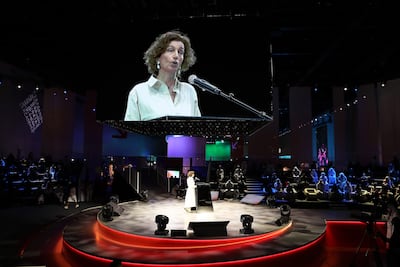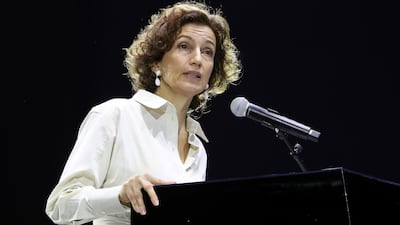It’s time to get serious when discussing culture’s contribution to society and economies, says Unesco director general Audrey Azoulay.
Speaking to The National after delivering a keynote address at the World Conference on Creative Economy event on Tuesday, the United Nations official describes how Covid-19 has accelerated the understanding of culture’s role within the public and private sectors.
“One of the lessons of the pandemic is to truly appreciate the power of culture, and that doesn't only apply for the economy, but also to the importance of heritage,” she says. “We see that, for instance, by not being able to gather in places and experience events, we felt like we are missing something important.
“At Unesco, we have been working very hard to show the impact of creative industries and in that process we have found that it has been severely under-evaluated.”
However, ignorance surrounding the creative and cultural industries is not the sole reason for that estimate, Azoulay believes.
“It is a very fragmented sector and it’s not full of large, big industries and instead is full of those much smaller,” she says.
“So we need to bring all that information together and present a global vision that shows the immense impact of the industry, and that's not only in terms of numbers but that of value such as soft power and inclusiveness.”

Work is already under way, with Unesco and the Department of Culture and Tourism Abu Dhabi launching a landmark report in March on Covid-19’s impact on the cultural and creative industries.
That report will form the centrepiece for future advocacy of government and financial institutions to increase support for the beleaguered industries, which — according to Azoulay's keynote address — lost more than $750 billion and 10 million jobs in 2020.
“It is necessary to have these kinds of figures available when you talk to these kinds of bodies,” she says. “It is about showing how culture is also about job creation and how it is an important way to include the next generation. These are all essential steps.”
The regional effect
With her parents hailing from Morocco and as a frequent visitor to the Arab world, Azoulay says the culture and creative industries can play a galvanising role across Mena.
“We are talking about an area with a huge youth population and unemployment,” she says. “So these industries can play an important role in not only filling those essential gaps but also barriers between generations in terms of mutual understanding.”
Azoulay has seen some of these formed connections first hand in the Iraqi city of Mosul.
A Unesco project co-funded by the UAE government in 2018, called Revive the Spirit of Mosul, aims to rebuild the city's historic landmarks, such as the 12th century Al Nuri Mosque and its leaning minaret, the Al Saa’a Church and the 800-year-old Al Tahera church.
The UAE has invested $50 million (Dh183.6m) in the projects.
“It is one our big success stories because it shows what culture can provide terms of giving people a sense of hope for the future through employment and in understanding the importance of their past,” Azoulay says.
“Mosul is a city renowned for its cultural diversity, a centre of knowledge with its libraries which have been destroyed by terrorism.
“So the initiative has people from different generations and religions working together in a project that unites them all.”
Abu Dhabi joins esteemed Unesco list
Another collaborative initiative that continues to bear fruit is the Unesco Creative Cities Network.
Launched in 2004, the programme promotes co-operation among cities recognised as cultural hubs regionally and internationally.
Abu Dhabi recently joined the esteemed list, which includes more than 50 cities, including Liverpool in England, Ramallah in Palestine, Seville in Spain and Mannheim in Germany.
Azoulay says the UAE capital's cultural institutions and creatives are set to benefit from the comprehensive global array of industry contacts, including musicians, festival organisers and influential cultural figures, to create new collaborations at home and abroad.
“We have also seen the effect of that initiative during Covid-19 with many cities working together to help Beirut, which is also part of the network, after the port explosion,” she says. “Some of that included sharing knowledge when it becomes to best practices for certain initiatives taking place during the pandemic.”
These are all encouraging signs that discussions and initiatives surrounding culture and creativity have evolved well beyond the prism of entertainment and leisure, she says.
From its economic and social benefits to building bridges with communities and cultures, Azoulay says the creative industries will only grow in size and importance.
“In this time of crisis we have seen more than ever the essential role of culture in the cohesion of society and to bring people together,” she says.
“We should seize the long-term opportunities offered by the creative economy because it is a sector which employs more young people than others … [and] essential to the developments of societies.”
The World Conference on Creative Economy runs until Thursday, December 9 at the Dubai Exhibition Centre, Expo 2020 Dubai. For more information, go to wcce.ae


